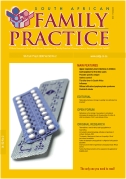The Impact of Diarrhoea in Infants on the Quality of Life of Low-Income Households
Keywords:
Diarrhoea, rotavirus, infant health, quality of life, rural health
Abstract
Background: This article reports on a study that explored the impact of diarrhoea in babies on the quality of life of low-income households. Diarrhoeal diseases continue to be an important cause of illness and death worldwide. One major cause of infantile diarrhoea is the rotavirus, an airborne virus to which almost all children in both the developing and developed world will be exposed to at least once. The study, as well as the clinical trials and cost studies, was commissioned by GlaxoSmithKline to assist in the decision-making processes regarding whether and how to implement a newly developed vaccine against rotavirus through national immunisation programmes. The objective of the study was to obtain a comprehensive understanding of the impact of severe diarrhoea in babies on the quality of life of a selected group of low-income households. Methods: The study was qualitative, explorative and descriptive in nature. A recently developed quality of life (QoL) assessment instrument, based on a comprehensive list of fundamental needs developed by development expert Manfred Max-Neef, was used to assess the impact of diarrhoea in babies on households. The QoL instrument includes 125 open questions related to basic necessities and activities, localisation, relationships and consciousness of household members. In addition, group and individual interviews were held. Twenty-nine households with children younger than two years of age who had experienced diarrhoea in the previous two months were selected. By means of a number of medical questions related to the duration of the diarrhoea and related symptoms, babies with severe diarrhoea were purposively sampled. After analysis of the data, these babies were classified as follows: 20 had severe diarrhoea, six had moderate diarrhoea and three were diagnosed as having had mild diarrhoea. Two babies were previously admitted to the hospital. Of the 29 households surveyed, 22 households were interviewed using the QoL assessment instrument, and seven households were interviewed by means of group and individual interviews. Ethical approval for the research was obtained from the ethics committee of the Faculty of Theology at the University of Pretoria. Results: Poor housing conditions exacerbated the effect of diarrhoea in infants on the primary caregiver as well as the other household members. Household members complained about the sound of the babies crying and almost half of the mothers reported that they felt stressed or ashamed about the quality of air in their dwellings. One mother said that the smell was so bad that she could not eat her food because it caused her to vomit. The lack of basic necessities, for example the shortage of water in a number of households, intensified the struggle to cope with the diarrhoea. It was found that the burden of care fell mainly on the mothers of the babies with diarrhoea. The pressure experienced by some mothers seems to be related to the way they experience their identity. Mothers indicated that they felt responsible for tasks in and around the household, including the duty of caring for their children. This places a physical and emotional burden on the primary caregiver. Diarrhoea was the cause of tension and conflict in a number of households, not only because of inflated financial costs related to efforts to cope with the illness, but also because of differing views among household members regarding the most suitable treatment Western or traditional medicine. Mothers identified different causes of the diarrhoea, including teething, heat, wrong food and ‘the problem of the fontanelle’. It became evident that some mothers believed that a sunken fontanelle was the cause of diarrhoea, and this was believed to be best treated by traditional healing methods. Conclusion: A vaccine against rotavirus diarrhoea could benefit the households in this research by: • Reducing the emotional burden of care on the mother; • Reducing the physical burden of care on the mother, and • Reducing the financial burden that childhood diarrhoea imposes on households. Note of caution: The findings show how rotavirus vaccines could be an adjunct to the primary prevention approach for diarrhoea diseases in children. A vaccine will not substitute for all the other important requirements for a respectable quality of life, such as love, care, education, healthy nutrition, a regular safe water supply, and good sanitation. It is also important to interpret the findings in conjunction with other rotavirus vaccine clinical trials and cost-benefit studies.
Published
2008-02-28
Section
Original Research
By submitting manuscripts to SAFP, authors of original articles are assigning copyright to the South African Academy of Family Physicians. Copyright of review articles are assigned to the Publisher, Medpharm Publications (Pty) Ltd, unless otherwise specified. Authors may use their own work after publication without written permission, provided they acknowledge the original source. Individuals and academic institutions may freely copy and distribute articles published in SAFP for educational and research purposes without obtaining permission.

